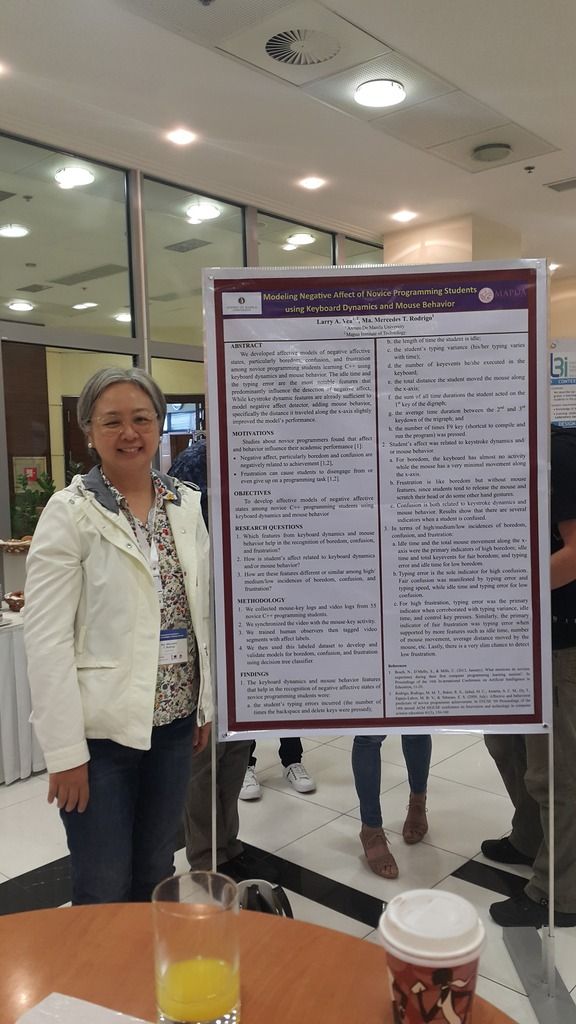The ALLS Lecture Series
Monday, 24 October 2016, 3:00 to 4:30, Faura 206
ADMISSION IS FREE
The talks presented during this lecture series represent current research of the Ateneo Laboratory for the Learning Sciences. The October 24 talks will feature brief presentations from PhD Computer Science and MS Computer Science students who are close to defending their proposals.
AN INVESTIGATION OF THE IMPACT OF GAMIFICATION ON NOVICE PROGRAMMERS’ ACHIVEMENT AND LEARNING EXPERIENCE
Jen Agapito
Gamification is becoming a popular classroom intervention used in computer science instruction, including CS1, the first course computer science students take. It is being operationalized as a medium to encourage certain student behaviors in anticipation of positive effects on learning experience and achievement. However, existing studies have mostly implemented reward-based game elements which have resulted to contrasting behaviors among the students. Meaningful gamification, defined as the use of game design elements to encourage users build internal motivation to behave in a certain way, is contended to be a more effective approach. This research focuses on the exploration of how a pedagogical tool founded on meaningful gamification will affect the achievement and learning experience of novice programmers. It will also explore how different user types, as characterized by the Gamification User Types Hexad, vary in their response to different game design elements. It seeks to contribute an empirical investigation of the impact of gamification to novice programmers’ achievement and learning experience.
DESIGNING UX AND UI FOR PERCEIVED CREDIBILITY OF GOVERNMENT WEBSITES
Zarah Elizabeth Arcega
The Philippine administration is making an effort towards the strengthening of e-government in the country so as to adapt to today’s digital landscape. Among their initiatives is the creation of government websites for their various offices. It has been identified that website credibility is perceived by users primarily through visual appeal and navigability. UX and UI design, however, are not as implemented on these kind of websites despite their importance. With that, this study aims to evaluate the perceived credibility of Philippine government websites currently deployed online, create reconfigured versions based on existing models and principles to compare them with, then derive specific guidelines which may be applied in the design and development of such websites.
LEVERAGING AN EXISTING COURSE MANAGEMENT SYTEMS FOR ALTERNATIVE LEARNING
Mikaela Malit
Various learning institutions have made use of learning managements systems (LMS) to support traditional classroom-based courses. This study aims to investigate the effectiveness of introducing Moodle as a supplement to the occasional lessons offered in the Alternative Learning System (ALS) program of the Department of Education. The LMS intends to help ALS teachers manage students and resources as well as contribute to the improvement of student performance by enabling online access to ALS modules, delivery of real-time feedback through quizzes, and monitoring of student profiles. A dynamic quiz generation plugin will also be developed and installed in Moodle to aid ALS teachers in creating quiz content using PDF files. Effectiveness of the LMS will be determined through usability and user acceptance tests, student scores in post-tests and pre-tests, and feedback of ALS management.
AN INVESTIGATION OF THE EINSTELLUNG EFFECT AMONG NOVICE AND INTERMEDIATE PROGRAMMERS
Jun Rangie Obispo
Einstellung effect (EE) is a phenomenon that refers to an individual’s bias towards a familiar, working solution to solve other problems even though more appropriate solutions are available. In the context of programming, the Einstellung effect poses some problems because programmers utilize only solutions they are comfortable with, or approaches they know. This study investigates EE among novice and intermediate programmers when they solve a series of programming problems with similar nature. We look into their plan structures to see resemblances of how they compose plans in solving the programming problems. This study also investigates some mechanisms to address this problem in fixatedness.
THE CREATION OF A GAME SIMULATING AUTISM SPECTRUM DISORDER TO INDUCE EMPATHY IN NEUROTYPICAL PLAYERS
Hannah Tee
Despite autism spectrum disorder (ASD) in approximately 1-2% of the world’s population, people with ASD are greatly stigmatized, leading to an overall lower quality of life. In order to address this, empathy must be induced in non-autistic, neurotypical people. As such, the aim of this study is to create a game which would allow neurotypical players to experience how it is to have ASD. In doing this, the following questions will be answered: (1) Which aspects of autism spectrum disorder can be effectively gamified? (2) Which game elements best simulate aspects of autism spectrum disorder? (3) Which game elements best induce empathy towards ASD in neurotypical players? (4) To what extent is a game effective in inducing empathy in neurotypical players? And (5) Would neurotypical players respond more positively towards specific cases of autism or generalized cases? If so, by how much?
For this study, clinicians and people with ASD will be interviewed to determine which aspects of ASD should be included in the game to convey to neurotypical players, after which a game with 3 levels will be developed on Unity 5.4.x. The game will then be played and evaluated by 10 experts (5 clinicians and 5 people with ASD) and 20 neurotypical players through questionnaires. The experts will evaluate the extent to which aspects of ASD were simulated. Meanwhile, the 20 neurotypical players will be split into 2 groups: a “general playthrough” group and a “specific case playthrough” group. Both groups will indicate which game elements they found most inducive of empathy. The questionnaire will also measure the players’ empathy towards ASD, and will compare the measures of the 2 groups to determine if the specification of cases has any affect on empathy.
To register, click here.




